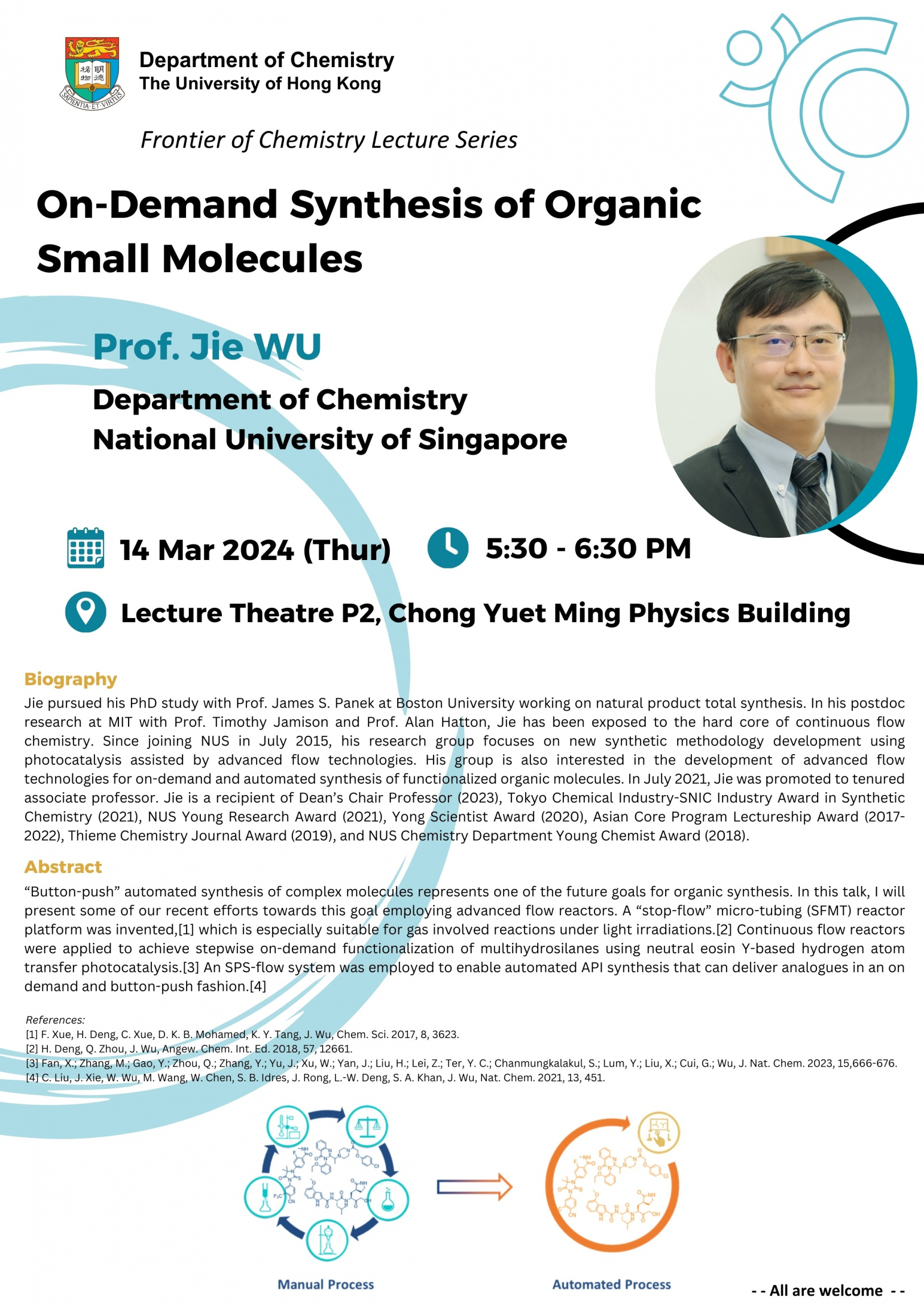| Date | 14 Mar 2024 |
| Time | 5:30 - 6:30 PM (HKT) |
| Venue | Lecture theatre P2, Chong Yuet Ming Physics Building |
| Speaker | Prof. Jie WU |
| Institution | Department of Chemistry, National University of Singapore |
 Title:
Title:
On-Demand Synthesis of Organic Small Molecules
Schedule:
Date: 14th March, 2024 (Thursday)
Time: 5:30 - 6:30 pm (HKT)
Venue: Lecture Theatre P2, Chong Yuet Ming Physics Building
Speaker:
Prof. Jie WU
Department of Chemistry
National University of Singapore
Biography:
Jie pursued his PhD study with Prof. James S. Panek at Boston University working on natural product total synthesis. In his postdoc research at MIT with Prof. Timothy Jamison and Prof. Alan Hatton, Jie has been exposed to the hard core of continuous flow chemistry. Since joining NUS in July 2015, his research group focuses on new synthetic methodology development using photocatalysis assisted by advanced flow technologies. His group is also interested in the development of advanced flow technologies for on-demand and automated synthesis of functionalized organic molecules. In July 2021, Jie was promoted to tenured associate professor. Jie is a recipient of Dean’s Chair Professor (2023), Tokyo Chemical Industry-SNIC Industry Award in Synthetic Chemistry (2021), NUS Young Research Award (2021), Yong Scientist Award (2020), Asian Core Program Lectureship Award (2017-2022), Thieme Chemistry Journal Award (2019), and NUS Chemistry Department Young Chemist Award (2018).
Abstract:
“Button-push” automated synthesis of complex molecules represents one of the future goals for organic synthesis. In this talk, I will present some of our recent efforts towards this goal employing advanced flow reactors. A “stop-flow” micro-tubing (SFMT) reactor platform was invented,[1] which is especially suitable for gas involved reactions under light irradiations.[2] Continuous flow reactors were applied to achieve stepwise on-demand functionalization of multihydrosilanes using neutral eosin Y-based hydrogen atom transfer photocatalysis.[3] An SPS-flow system was employed to enable automated API synthesis that can deliver analogues in an on demand and button-push fashion.[4]
References:
[1] F. Xue, H. Deng, C. Xue, D. K. B. Mohamed, K. Y. Tang, J. Wu, Chem. Sci. 2017, 8, 3623.
[2] H. Deng, Q. Zhou, J. Wu, Angew. Chem. Int. Ed. 2018, 57, 12661.
[3] Fan, X.; Zhang, M.; Gao, Y.; Zhou, Q.; Zhang, Y.; Yu, J.; Xu, W.; Yan, J.; Liu, H.; Lei, Z.; Ter, Y. C.; Chanmungkalakul, S.; Lum, Y.; Liu, X.; Cui, G.; Wu, J. Nat. Chem. 2023, 15,666-676.
[4] C. Liu, J. Xie, W. Wu, M. Wang, W. Chen, S. B. Idres, J. Rong, L.-W. Deng, S. A. Khan, J. Wu, Nat. Chem. 2021, 13, 451.
- ALL ARE WELCOME -
